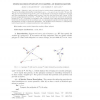Free Online Productivity Tools
i2Speak
i2Symbol
i2OCR
iTex2Img
iWeb2Print
iWeb2Shot
i2Type
iPdf2Split
iPdf2Merge
i2Bopomofo
i2Arabic
i2Style
i2Image
i2PDF
iLatex2Rtf
Sci2ools
113
click to vote
SIAMREV
2010
2010
From Random Polygon to Ellipse: An Eigenanalysis
Suppose x and y are unit 2-norm n-vectors whose components sum to zero. Let P(x, y) be the polygon obtained by connecting (x1, y1), . . . , (xn, yn), (x1, y1) in order. We say that P(x, y) is the normalized average of P(x,y) if it is obtained by connecting the midpoints of its edges and then normalizing the resulting vertex vectors x and y so that they have unit 2-norm. If this process is repeated starting with P0 = P(x(0), y(0)), then in the limit the vertices of the polygon iterates P(x(k), y(k)) converge to an ellipse E that is centered at the origin and whose semiaxes are tilted forty-five degrees from the coordinate axes. An eigenanalysis together with the singular value decomposition is used to explain this phenomena. The problem and its solution is a metaphor for matrix-based research in computational science and engineering. Key words. power method, eigenvalue analysis, ellipse, polygon AMS subject classifications. 15A18, 65F15
| Added | 21 May 2011 |
| Updated | 21 May 2011 |
| Type | Journal |
| Year | 2010 |
| Where | SIAMREV |
| Authors | Adam N. Elmachtoub, Charles F. Van Loan |
Comments (0)

